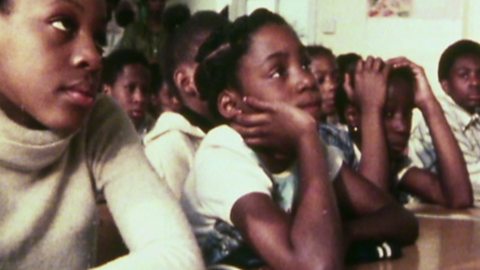Video summary
Kenyah Sandy, who plays Kingsley Smith in Steve McQueen's Small Axe, tells the story of how hundreds of children were taken out of mainstream schools and sent to Educationally Subnormal Schools (ESN schools) in the 1970s.
At the time, all London school children were made to take an IQ test which lots of black children failed. Many of the them were Windrush children, who came over to the UK from the West Indies with their families.
The IQ test asked questions that were very hard for children who had recently arrived in Britain, and were biased against those coming from a different culture.
Parents were told their children were being sent to a special school, where their needs would be met and they would thrive. But in reality, children between the ages of four and 16 could be put together in the same class, and pupils without learning difficulties could be put in classes with pupils with severe learning difficulties.
As children began to struggle with the basics of reading and writing, parents and action groups began to confront teachers and campaigned to close these schools for good.
The black community came together to set up supplementary Saturday schools, run by black teachers and parents to fight against the racism and inequality their children were experiencing. The lessons compensated for all the subjects they were missing out on, including reading, writing and maths.
The children were also taught about black history and West Indian culture.
Although the ESN schools were eventually closed, they had a lasting effect on today's black community.
Teacher Notes
This short film is suitable for KS3 and KS4 students. It can be used alongside the other Small Axe ┬ÚÂ╣ď╝┼─ Teach films or independently.
It could fit as part of a KS3 history curriculum when looking at ÔÇśsocial, cultural and technological change in post-war British society.ÔÇÖ For example, it could be integrated into an enquiry or scheme of work looking at migration to Britain or black British history.
At KS4, the film could be used to illustrate the experiences and treatment of migrants to Britain after World War Two as part of the AQA ÔÇśEmpire, Migration and the PeopleÔÇÖ course, the OCR ÔÇśMigrants to BritainÔÇÖ course or the forthcoming Edexcel Migration course.
It could also be used in a lesson looking at how education has changed over time or to spark discussion about educational inequality.
Before watching the film:
Prior to this lesson you may want to introduce students to other relevant preceding events in post-war black British history to provide context. For example:
- the arrival of the Empire Windrush in 1948
- the 1948 British Nationality Act, which conferred equal citizenship status to people in Britain and her colonies
- the changing nature of migration (at first it was mostly young, single adults but over time more families and children moved to Britain from the Commonwealth)
- the discriminatory bussing of black and Asian students in the 1960s and 1970s in an attempt to disperse them
During watching the film:
You may want to pause the video at certain points to check for understanding. Alternatively, you could wait until the end and pose questions such as:
- Why were children sent to ÔÇśEducationally Subnormal SchoolsÔÇÖ?
- In what ways were these schools ÔÇśnothing specialÔÇÖ?
- How were the West Indian community discriminated against by the education system?
- How did the black community respond to being let down by the education system?
- What was taught in supplementary schools?
- What happened to Educationally Subnormal Schools?
- Why do you think director Steve McQueen might have chosen to make ÔÇśEducationÔÇÖ as part of his Small Axe collection of films?
Following on:
You could ask students to summarise the key points of the video and KingsleyÔÇÖs story. This could be done in various different ways, through storyboarding or bullet points. At KS4 the film may serve as a case study in a lesson about West Indian migration to post-war Britain.
ESN teacher and activist, Bernard Coard features briefly in the film. He wrote the seminal book ÔÇśHow the West Indian Child is made Educationally Sub-Normal in the British School SystemÔÇÖ in 1971. One option is to use the film as part of a lesson looking at why Bernard Coard wrote the book and what impact it had, with a focus on parental activism.
A range of relevant primary source material exists. has a selection of sources available on its website, such as letters about ÔÇśHow the West Indian Child is made Educationally Sub-Normal in the British School SystemÔÇÖ and campaign leaflets. It also has information about the broader Black Education Movement and specific campaigns within it, for example the Haringey Anti-banding campaign, partly sparked by the leak of ÔÇśThe Doulton Report.ÔÇÖ
The Black Cultural Archives holds a variety of sources, a small number of which are available online, including poetry and a child writing about her experience of schooling in London. Windrush: The Irresistible Rise of Multi-Racial Britain by Mike & Trevor Phillips contains many oral history excerpts in chapters about childrenÔÇÖs experience of schooling and parental activism.
The recent Windrush Scandal has primarily affected children who arrived in Britain in this period. You may wish to draw attention to this and use the film as an opportunity to explore what the Windrush Scandal is, what caused it and how the government has responded.
The Mangrove Nine. video
Rochenda Sandall, who plays one of The Mangrove Nine in Steve McQueen's Small Axe, tells the true story of this significant event in British history.
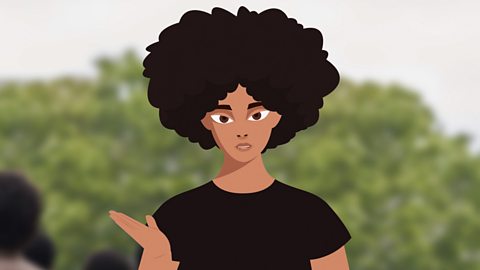
Blues Parties. video
Micheal Ward, who plays Franklin in Steve McQueen's Small Axe, explores the eruption of Blues parties in London between the 1960s and 1980s.
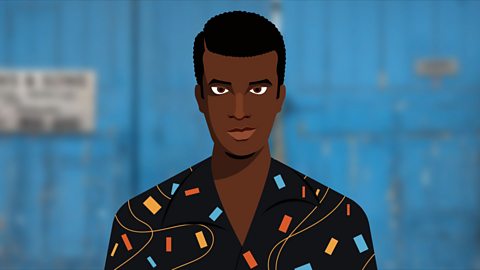
Alex Wheatle and the Brixton Uprising. video
In his own words, this is story of Alex Wheatle MBE, who grew up in a children's home and later became an award-winning writer of books for children and young adults.
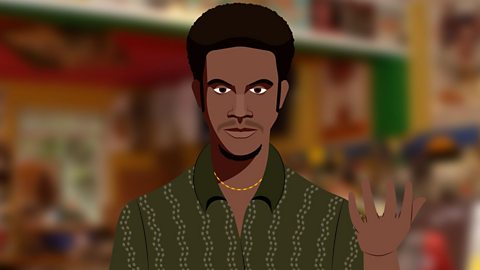
Leroy Logan and the Metropolitan Police. video
In his own words Leroy Logan MBE, one of the few black police officers in the Met when he joined in 1983, narrates and shares his experiences of prejudice in the police force as portrayed in Steve McQueen's Small Axe.
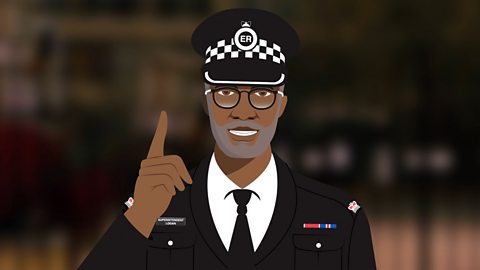
Subnormal - A British Scandal. video
This short film for secondary schools examines how black children in the 1960s and 1970s were disproportionately sent to schools for the so-called ÔÇśeducationally subnormalÔÇÖ.
